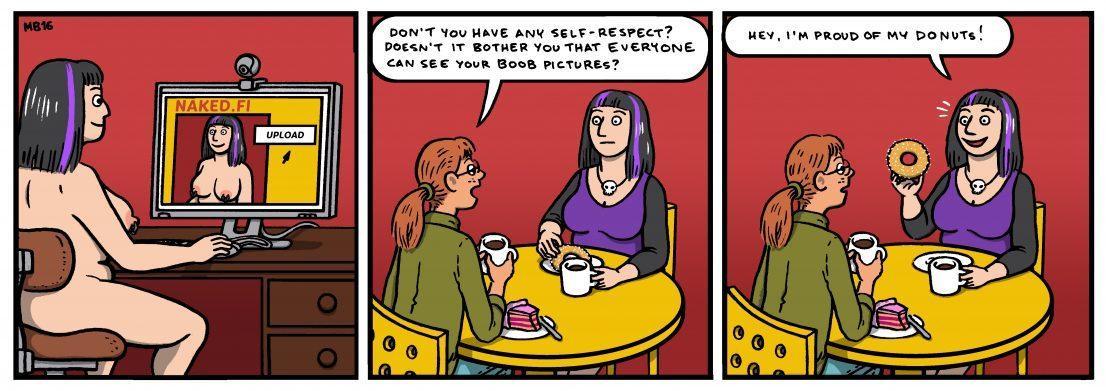Boobs Online

You have the right to feel proud about the way you look. You do not have to tolerate any form of abuse or insults from others.
The internet and social media provide good tools for self-expression: you can share your thoughts, pictures and situations with others online. People want to make a good impression online. They upload photographs where they think that they look good or sexy.
However, explicitly sexual behaviour or revealing clothes do not always inspire positive feedback from others. Other people’s photos and bodies can be harshly criticized. Taking joy in one’s appearance and sexuality may turn into insecurity because of other people’s comments.
Who Decides?
You? Your mother? Friends? Partners? Everyone has the right to make their own decisions concerning their body. This also applies to appearing in photos and controlling one’s online identity.
It is ok to be open and positive about one’s own body and sexuality. Expressing one’s sexuality is permissible also online. Even if there are risks in sharing photos and disclosing information about sexuality, everyone has the right to make their own decisions about them. No one else can judge, whether it is more valuable to be open about own sexuality or act more carefully.
- What would you think or feel, it your sexy pose or nude picture would be shared online without your consent? How could you deal with the situation, or prepare to handle the risk in advance?
- What would you do if you found a nude photo of your friend online?
- Why is explicitly sexual behaviour sometimes judged negatively?
What to Do if Something Bad Happens
The privacy of photos can be regulated using the privacy settings in many services. However, photos, updates, comments or other texts may still spread despite strict privacy settings. The person who spreads photos without permission or abuses them in any way is always responsible for the misuse or inappropriate comments – not the person who has uploaded the material online.
You do not have to tolerate abuse, insults or nasty comments. You should reply to nasty comments matter-of-factly and directly, for example: ”I think your comment is inappropriate” or ”If you continue that, I will block you!” Many services allow you to block users or report inappropriate comments. You can also challenge the commenter to think about their behaviour and its consequences. It might help sometimes, if the commenter has acted out of inconsideration.

